SAO PAULO (Reuters) – General Motors Co (GM.N) has warned employees in Brazil that new investments there depend on a painful plan to return to profit in the country, according to a memo seen by Reuters on Saturday.
The GM logo is seen at the General Motors headquarters in Sao Caetano do Sul, Brazil March 13, 2018. Picture taken March 13, 2018. REUTERS/Leonardo Benassatto
In a message posted at Brazilian plants, GM’s top executive in Brazil and Argentina, Carlos Zarlenga, said after running up a heavy loss over the past three years the operation had reached “a critical moment that will require sacrifices from everyone.”
The memo referenced comments that Chief Executive Mary Barra made during investor presentations last week about challenges in South America. “We are not going to keep deploying capital to lose money,” she said, in a quote repeated by Zarlenga.
GM spokesmen in Brazil did not immediately comment on the memo, which was first reported by newspaper O Estado de S.Paulo.
The dire tone came as a shock to some workers in Brazil, where GM has overtaken Volkswagen AG (VOWG_p.DE) and Fiat Chrysler Automobiles NV (FCHA.MI) to become the industry sales leader as the economy rebounds slowly from a deep slump.
In April 2018, Zarlenga touted a new family of low-cost cars hitting Brazilian dealerships this year as he played up progress in an interview with Reuters. He said cost reductions in the downturn, including a 35 percent cut to the Brazilian workforce, led to a narrow profit in South America in 2017.
While Brazil’s economy has gradually recovered after a 2015-16 recession, Argentina fell back into recession last year as inflation surged and its currency cratered. Investors are watching to see if the presidents of both countries can pull off the tough economic reforms they have promised.
Zarlenga said regional executives had prepared a “viability plan” for senior management in Detroit, but they still need the support of local unions, suppliers, dealerships and government. “GM investments and our future depend on this plan,” he said.
Last year, Brazil’s government granted carmakers a 15-year package of tax breaks – extending subsidies for an industry that has struggled to compete directly with production elsewhere.
Economy Minister Paulo Guedes, who took office with a new government this month, has said Brazil cannot afford to keep subsidizing powerful industries, arguing that an end to protectionist policies will make the economy more competitive.
Reporting by Marcelo Rochabrun; Additional reporting by Tatiana Bautzer; Writing by Brad Haynes; Editing by Tom Brown






Leave a Reply